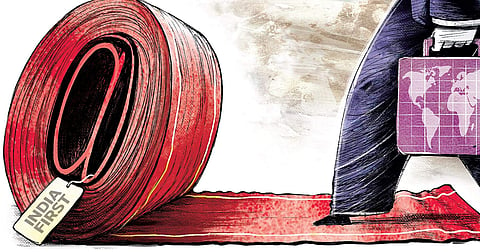

In today’s world, e-commerce has acquired importance. India has been experiencing significant growth in e-commerce, with many small companies mushrooming and a few giants striving to take over the huge Indian e-commerce market. Flipkart, Amazon, Snapdeal, Uber, Ola, etc. are a few examples. Some of them are said to be home-grown, in the sense that their promoters have been Indians. But later they attracted foreign equity, and ultimately are dominated by foreign investors. As per the law of the land, foreign investment is not allowed in e-commerce. So, these companies got foreign investment in the name of the marketplace model. In this way, while running full-fledged e-commerce businesses, they were circumventing the law.
In 2016, to somehow accommodate the operation of these companies, which were not following the legal norms, the Department of Industrial Policy and Promotion (DIPP) came out with a policy framework in the form of Press Note-3, 2016. Though FDI was disallowed in e-commerce, it was allowed for a marketplace model, with three major conditions. First, these marketplaces should not influence the prices of goods and services and offer discounts. Second, they were not allowed to hold inventories (stock) and third, no single vendor would be providing over 25 per cent of sales.
Recently, there were two major developments with respect to e-commerce, which necessitated clarity at the policy level. In the last Ministerial Conference of WTO in Buenos Aires, there was a concerted effort by many developed countries to include e-commerce in the WTO trade negotiations. At different bilateral and regional trade negotiations, especially the Regional Comprehensive Economic Partnership (RCEP), there has been pressure on India to give a commitment over its stand on e-commerce. Since India doesn’t have a e-commerce policy per se, it is imperative to first have such a policy. Secondly, in the month of May 2018, Flipkart made a deal with global retail giant Walmart for the sale of 77 per cent of its equity to the latter. Flipkart has been facing allegations of flouting FDI rules and of circumventing the law in many ways. Then started a debate that the quantum of discounts offered by these giants will sound the death knell for conventional shopkeepers, booksellers, e-commerce, start-ups, and job opportunities. All this requires a clear cut e-commerce policy for India.
On 30 July 2018, the Ministry of Commerce and Industry circulated a Draft E-commerce Policy. It talks about a whole range of issues in e-commerce including data localisation, level playing field for the small players, curbing of discounts, consumer protection and promotion of domestic manufacturing (Make in India). This draft policy is being called ‘India First’ e-commerce policy. It underlines that data is the oil of digital economy.
The document states: “The burgeoning online retail trade ... has data flows at its foundation. Communication over mobile phones using mobile applications ... not only generates a vast array of data, including physical location, financial details and consumer preference, but also creates a dynamic profile of the individual user ...The history of browsing and search by consumers also generates rich information of consumer preferences ... By tracking the search history, online retail websites are able to target consumers with tailor-made marketing content.”
The draft proposes compulsory local storage of data collected or mined by e-commerce companies, for the benefit of small players to ensure a level playing field. This is also to ensure there is access to data stored in India for national security and public policy objectives, obviously subject to rules related to privacy, consent, etc. This is an exemplary policy in a world dominated by big players who enjoy monopoly over data, which is used and misused by these players to maximise their economic objectives. Adopting a balanced approach, the draft policy says only personal data or community data collected by ‘internet of things’ devices in ‘public space’ will need to be stored in India. Other data, which has no personal or community implications, can be stored anywhere. Further, it suggests a two-year sunset period before making data localisation mandatory.
But how to make the e-commerce giants follow the rules? At present, the rules impose restrictions on the e-commerce marketplace, to not directly or indirectly influence the price of sale of goods and services. The draft seeks to extend this restriction to group companies of the e-commerce marketplace. This is welcome as it would plug the loopholes in the present rules. It seeks to introduce a sunset clause that defines the maximum duration of differential pricing strategies (such as deep discounts) by e-commerce platforms. Though it seems to be taken with good intentions, this period needs to be shortened, to discourage companies from misusing their financial muscle.
There are several such rules as notified under Press Note-3 being circumvented by marketplaces funded by FDI including inventory holding that this draft policy tries to underline. However, the draft suggests Indian-owned and Indian-controlled online marketplaces be allowed to hold inventory as long as products are 100 per cent domestically produced. There is a strong likelihood that this clause may be misused by market places to circumvent multi-brand retail FDI norms.Along with tightening the noose over big e-tailers, the draft also proposes a regulator of e-commerce. Though domestic retailers and small e-commerce players have welcomed the policy, the most unhappy lot are the big MNCs and foreign-owned e-commerce businesses, as they don’t like any control over their businesses.
India urgently needed a well- defined e-commerce policy, not only to provide a level playing field, but also to facilitate negotiations at WTO and other regional trade negotiations. This draft policy seeks to not only balance the interests of domestic players, but also saves the policy space for future.
Ashwani Mahajan
Associate Professor, PGDAV College, University of Delhi
Email: ashwanimahajan@rediffmail.com